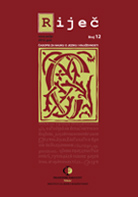MIRKO KOVAČ; GUBILIŠTE KAO OGLEDALO POSTMODERNISTIČKE PESIMISTIČNO-IRONIČNE
DEKONSTRUKCIJE SOCREALISTIČKE ATEISTIČKE IDEOLOGIJE OPTIMIZMA
MIRKO KOVAČ; GUBILIŠTE AS A MIRROR OF POSTMODERNISTIC PASIMISTIC AND IRONIC DECONSTRUCTIONS OF THE SOCIALIST ATEISTIC IDEOLOGY OF OPTIMISM
Author(s): Amra KOZLICASubject(s): Language and Literature Studies
Published by: Filološki fakultet, Nikšić
Keywords: Mirko Kovač; Gubiliste; postmodernism; mirrors; Golgota; Bible; church; sv. Georgie; the snake; the sun; the drama register; Montenegro; Herzegovina; father; train; dungeon; death; irony; grotesque
Summary/Abstract: Mirko Kovač, who was often referred to as a Montenegrin, Serbian and Croatian writer, published his first work, entitled Gubilište, in 1962, which can, typologically, be defined as a postmodern novel. This novel, in its entirety, represents a living thoughtful surprise in the quest for new/old cognitions and redefinition of concepts: man, death, truth, religion, and ideology, at the very moment when it is expected that we will finally see and recognize the "truth", when we find ourselves at the time of losing the life in ourselves on various, but inevitable life Golgothas, and at this "end" we become painfully aware of the ineptness of cyclical repetition which is, necessarily, corrupted by the deformities that emerged from the social tradition, always marked by some of the ideologies. In essence, it represents a kind of pessimistic-ironical redefinition of Biblical stories of Golgotha, as the world's most famous wilderness that often defines the history of mankind, at least in Western European thought about the Day of Judgment and in almost all cultures of ever-anticipated Messiah. The pessimistic and ironic tone of narration is dominant throughout the whole work, which, at the semantic level, has been shaped into the image of the ironic attitude of a man towards the exaggerated social morality of modern times. As this profoundly pessimistic and utterly ironic vision of a man's relation to contemporary social events did not fit into the utterly optimistic aesthetics of the socialist proletarian inspiration, Mirko Kovač stays the first person to become the undesirable artist of the broad and freedom of thought, which, unfortunately, will repeat almost his entire life, in cycles of different social order.
Journal: Riječ
- Issue Year: 2015
- Issue No: 12
- Page Range: 115-130
- Page Count: 14
- Language: Serbian

